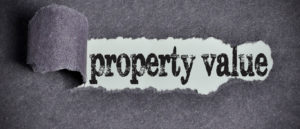Introduction
There are plenty of professional property buyers who claim to have mastered the knock-out bid. However, it’s just a marketing gimmick. It’s more likely to cost you thousands.
What it is
The knock-out bid is a tactic supposedly used by expert auction bidders to knock their competitors out of the auction with a big radical bid. I’ve also heard it referred to as a “slam” bid.
Instead of raising the price by small increments of one or two thousand dollars, the knock-out bidder puts in a large bid like $10,000 dollars.
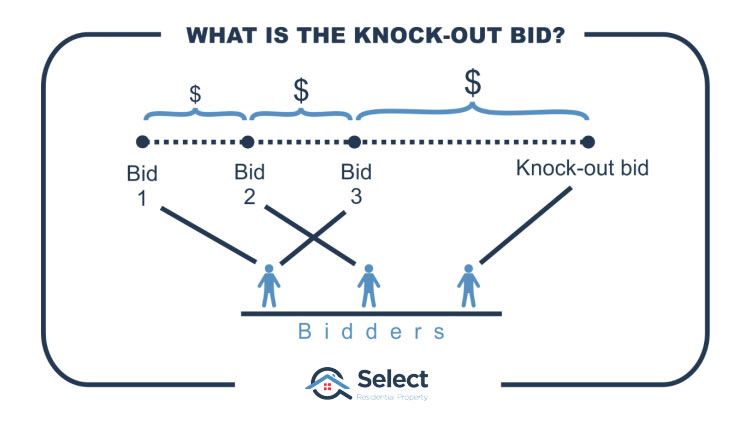
The theory is that the competition will feel intimidated. I’ve heard one professional put it this way:
“You want to give the perception that you have an endless supply of money that the person will just give up”
Hmm, really?
Imagine
Let’s just walk through that and see if it makes sense. Say you’ve found a property you like. You’ve been to a couple of the open inspections. And you’ve given it a lot of thought and discussed it with your partner. Both of you agreed it’s worth acquiring. You get a building inspection done and a pest inspection and you hire a conveyancer to go over the title. You’ve arranged finance and maybe even got an independent valuation. There’s a lot of trouble you’ve gone to in preparation for this auction. It’s no small deal.
The auction is this weekend and you have a budget of $550,000. You’re hoping the property will sell for around that mark, ideally for less, but you never know who’s going to turn up.
The expert
Now imagine a professional turns up to the auction, probably a buyer’s agent. They’ve discussed this opportunity with their client and plan to pay no more than $550,000 – same budget as you. But of course, you don’t know this. And they don’t know your budget either.
Now the professional has marketed themselves as an expert at auctions and one of their tricks is to make this knock-out bid.
The bidding
The bidding goes up by $5,000 increments until it reaches $510,000 when the expert jumps in with their knock-out bid: $530,000!

Now you’ve seen they’re a serious buyer and they appear to have a lot of money. So, you may as well pack up and go home, right? They’re going to win obviously because they jumped up in price by $20,000.
Hang on, what’s your budget? $550k. Where’s the price at? $530k. Why would you give up and walk away when the price hasn’t even reached your limit yet?
Why would anyone in your position do that? You’ve spent weeks arranging finance, you’ve visited the property a few times now and paid for building and pest inspections. You’ve gone to a lot of trouble and the price is below your budget. But just because the professional’s bid jumped up by $20,000, you’re going to give up? Is that a serious consideration to a normal human being, one that can afford to buy a property? Why would anyone just walk away when the top bid is below their budget?
Nobody & nothing
Nobody is going to walk away from the auction without at least having a crack with their top dollar.
So, what impact did the knock-out bid have exactly, – nothing! You come back with $532,000 and bidding continues.
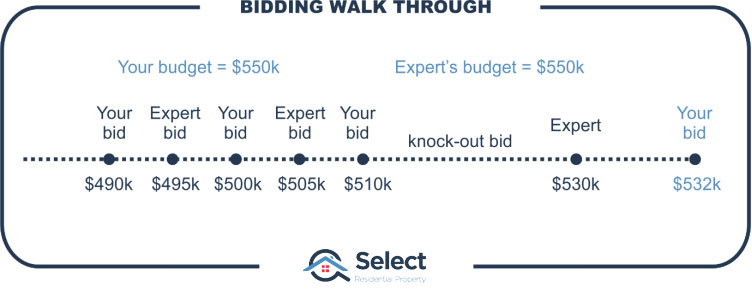
Let’s keep going though. Maybe bidding goes up by $1,000 increments from here all the way to $540,000 before the professional tries another knock-out bid: $550,000!
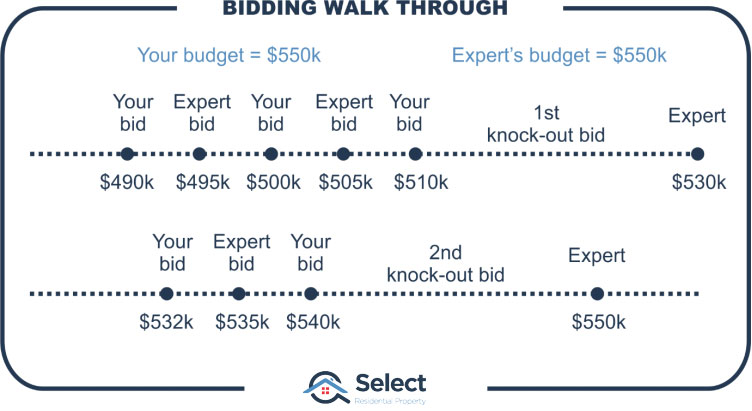
He is right at his limit now. And so are you. If you really can’t go any further, then you have to decline all invitations from the auctioneer to go any higher. You’re out and the expert wins.
How did they win?
The expert auction bidder will congratulate their client telling them that the knock-out bid worked. But really, all that happened, was you reached your limit. A limit that was decided prior to ever hearing any knock-out bids.
How come the 1st knock-out bid didn’t work but the 2nd one did? The 1st knock-out bid was twice as big as the second one. Why didn’t the 1st one work? Because the 1st knock-out bid didn’t exceed your limit, but the 2nd one did. Notice how it has nothing to do with the size of the bid increment, it had everything to do with the highest bid – the end value. The same result would have occurred if bidding incrementally exceeded your limit.
But what if your limit was only $540,000?
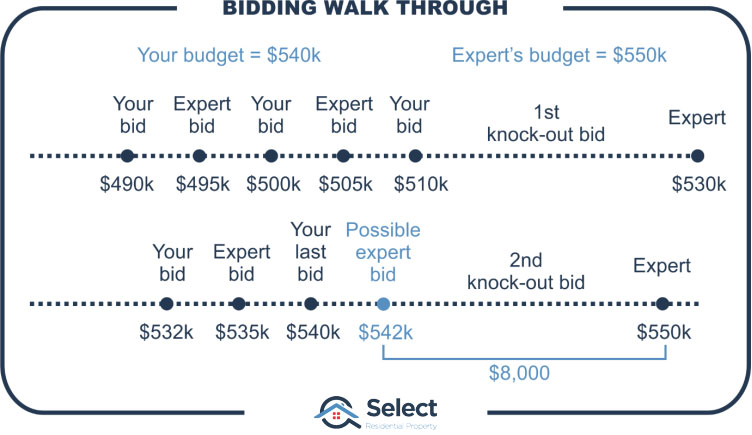
By not going up in increments of $2,000 the professional actually cost their client $8,000 more than the minimum price needed to win the auction.
Knock-out bids can be very costly. It’s highly unlikely they’ll ever actually save any money, far more likely to end up costing more.
Auctions are designed so that the highest bid wins and there are no tricks you can play to get around that.
“But I’ve seen it work”
No doubt there’ll be loads of professionals out there that will try to tell you they’ve seen it work. Here’s what I’ve heard:
Jeremy, how many auctions have you been to? I’ve been to over a thousand and I’ve used this successfully in dozens of cases. I’ve put in the slam bid and knocked out the last bidder to win the property for my client more times than I can remember.
What that tells me is that possibly a hundred thousand dollars more than necessary has been lost to an imaginary auction tactic.
But Jeremy, we appraised the property at $830,000 and won it at $815,000.
Maybe, but if the next highest bid was going to be $805,000, then you just cost your client $10,000.
When it works
The only time there could be any evidence of this tactic working, is if after the auction, one of the other bidders approached the expert and said something like:
I could tell you were gonna get this at any cost, so I thought why bother, I’ll quit early. I was actually gonna go as high as $700k, but I thought why should you spend $705,000? Why don’t I let you have it for $690,000? So, I stopped $10,000 early. Maybe you could buy me lunch now.
That doesn’t sound like an intimidated bidder to me. It sounds generous, maybe stupid, possibly even pure BS. But if the losing bidder’s statements could be believed, this would be some evidence that the trick works. Simply winning the auction with a knock-out bid isn’t evidence, it’s just coincidence.
What’s more likely
Think of it this way. Picture all the bidders who have lost an auction. Their last bid could have been only one of 3 options:
- Their maximum bid was smaller than the winning bid
- A bid above their maximum was still smaller than the winning bid
- Their last bid was lower than the winning bid and the winning bid was lower than their maximum planned bid
Which case is the most likely? Remember this is a bidder who has lost an auction.
What percentage of auction bidders would lose via option 1? Nobody knows, there’s no right or wrong answer. Just have an educated guess. Put yourself in the shoes of a bidder. Compare option 1 to option 2. Which option do you think is most likely?
I’m not sure which would be the most likely, option 1 or option 2. But I’m guessing the vast majority of auction outcomes have a bidder who lost via either option 1 or 2.
Do you think it’s realistic then that option 3 only occurs 1% of the time? Remember this is a bidder who has lost an auction. Someone else beat them. But the winning bid was lower than the loser’s maximum planned bid. Why? How can this occur?
Option 3 is more than just a bit peculiar. The auction loser didn’t bid their highest, but someone else won by bidding lower. In other words, the bidder could have won, but chose not to, because of the knock-out bid.
It’s nonsense, isn’t it?
Do you think auction laws would allow for, or prevent, intimidation from affecting the result? There’s a very simple rule – highest bid wins.
Some more nonsense auction advice
Here’s some more advice I’ve heard by professionals who seem a little desperate for attention:
Be early
Arrive early at least a half an hour.
How does getting there early help me win the auction? If I get there too late, after the hammer has fallen, I’ll obviously miss out, even if I had the highest budget. But getting their early doesn’t give me any credit with the auctioneer. If I turn up just before the third and final call and make the highest bid, I’ll win.
Know you competition
Experts also suggest you…
Survey the landscape, see who is there, and find out who your competition is.
How does knowing my competition help? Does it mean they’ll bid lower because I’ve checked them out?
Dress well
Here’s another one:
Dress smartly and portray confidence.
What’s that going to do? Will your competition bid lower because they feel under-dressed? If someone in a $2,000 power suit bids $500k and I bid $501k wearing shorts and a T-shirt, is the auctioneer going to ignore my bid?
Get in the way
Here’s some more nonsense…
Stand front and centre and let people know that you are there to bid.
You don’t need to stand in the way for people to know you’re there to bid. What you need to do… is bid.
Bid strongly
More…
Start with a strong bid and make your last bid as strong as your first bid.
Highest bid wins, regardless of how timidly it was made.
Wear sunglasses
More…
Wear sunglasses so other bidders can’t read you.
Again, concealing body language won’t win you an auction, the highest bid will.
Be late
More…
Turn up late in an expensive car so everyone sees you
This is pretty pathetic advice. Firstly, if you turn up late, the parking spot you’ll get will be well away from a well-attended auction. Secondly, regardless of how much wealth you ooze, you still need to bid higher than anyone else.
Backfire
Imagine a buyer processing these intimidatory tactics of a knock-out bidder. Not only is this advice pointless, it might even backfire if you’re too convincing. Other bidders might resent your wealth and bid foolishly above their budget just to waste your money assuming you’ll always out-bid them.
A faultless tactic
There’s only one tactic that will work. And the thing is: it works every time. To win an auction, simply bid higher than everyone else.
Conclusion
So, just to be clear: knock-out bids are nonsense. Nobody is going to walk away from bidding without at least offering their top dollar. If you have more money than another bidder, it makes more sense to bid in small increments until you just go over their limit.
It doesn’t matter what you’re wearing, how early you get there, who else is there, how confidently you bid, what your “read” is on your competition.
“What matters at an auction is whether your last bid is the last bid”
And that comes down to how much you’re prepared to pay.
Auctions can be very disheartening. You go to a lot of trouble researching the property and spend money on building and pest inspections too. It’s a terrible feeling for that to be a complete waste of time.
Professionals will prey on this and try to claim they can win auctions with certain… tricks. It’s simply not true. It’s just marketing. There are no tricks to winning auctions. The highest bid wins.
Why am I telling you this if there are no tricks you can apply to win auctions? I’m telling you this to make sure you’re aware of all the marketing tricks wanna-be professionals use to take your money.
- Challenge professionals
- Question expert advice
- Have some scepticism
The lesson is, challenge the professionals, question expert advice. Have a healthy level of scepticism. Soon you’ll recognise the difference between advice and marketing.
For more protective tips, check out other topics in this series.

